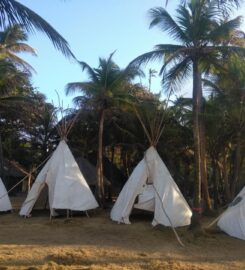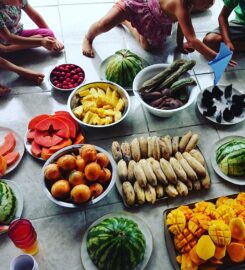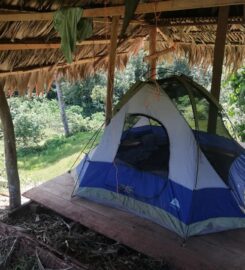Purafruta
Fruitarian community, eco-village, and fruit forest in Costa-Rica
Fruitarian Vegan Community in Costa Rica
Pura Fruta has evolved from a vision that we humans must be able to create a simpler, healthier, and more spiritually connected life for ourselves, a life that nourishes our souls, our hearts and our bodies. Instead of seeing the Earth as a resource to be ruthlessly exploited, we are committed to living in harmony with nature and the wild beings around us, sharing with them and accepting our advanced role as caretakers of this beautiful planet.

In our project vision we aim to: help each other to grow together in profound respect to ourselves, each other and Mother Earth. create a caring, safe environment free from intentional suffering or killing, consumption of drugs, chemicals or harmful products for our bodies or the environment. Cultivate and care for a permaculture based fruit forest, in order to create food self-sufficiency in the shortest time possible.
Co-create with nature a place where we can live in harmony and simplicity.Become an example of how to live in a truly sustainable way. We are bringing our vision to life through sharing sessions of our emotions and challenges; our passions and knowledge; through work-playing together, caring for each other and supporting each other through our stages of growth.

If you share our vision and would like to learn more about us please read on to discover how you can become a part of Pura Fruta. Come and learn how a simpler, peaceful, more joyful and connected life is possible.
Volunteer
Note: Yes, we are currently accepting volunteers.

Want to learn about permaculture and volunteer your time to a worthy cause?
If you’re interested in coming, please fill out the Volunteer Questionnaire here.
If you want to stay long-term as a resident/community member, you must start by first volunteering for two months. After that you may become a resident, and after 4 months as a resident, you may become a community member. Note that at any point during this process, you have the opportunity to buy land in the community and start your own homestead.
Read more about the differences between being a Guest, Trainee, Co-Creater (volunteer), Master, and being a community member, here.
If you would rather volunteer remotely, read more here.
We are a permaculture fruit forest project in the Carribean coast of Costa Rica! Our goal is to be a successful example for other farms in the area to trust in sustainable methods of farming. We already produce many bananas, rollinias, papayas, and other fruits, and are currently planting dozens of varieties of exotic fruits from all around the world!
Volunteer: Permaculture Education Program. We offer a volunteer program where you receive a comprehensive permaculture education. This is a great opportunity to learn about tropical fruit growing and sustainable permaculture techniques for growing your food.
We only accept volunteers who are vegan, as this is a vegan community. We also only accept volunteers who have experience in / are interested in a raw food diet, and are able to mostly abstain from cooked foods, and consume primarily raw foods while they are here, as this is another important community value of ours. Usually volunteers and residents here are eating all raw foods.
Volunteers…
- Receive instruction and workshops and participate in group activities based around the following topics: Care of fruit trees, mulching and soil health, soil amendments, biochar, compost systems, ground covers and other companion plants, planning tree placement, tropical fruit varieties and requirements of specific trees, basic banana care, basic papaya care, vegetable gardening in the wet tropics and more.
- Can eat food produced from the farm for free, but anything beyond that must be purchased themselves from local markets or neighboring farm. We usually do a weekly community produce order to make it easy. Volunteers should expect to spend between $20 and $80 per week on food, but that depends on their personal tastes and spending habits.
- Work in a group on most days, though you will have the opportunity for solitary tasks if you desire.
- Receive a set list of tasks to do (on the Trello task management app) and instruction on how to do them. We regularly have group activities and encourage people to work together.
- Receive a curated list of training videos regarding the permaculture techniques we use here. In addition to the videos, you receive hands-on instruction.
- Pay $50/month which includes use of facilities and kitchen, campsite accommodation, and all instruction/workshops
- Generally stay up to 2 months as a volunteer. After that, volunteers can either leave, or ask to become a longer-term community resident.
- Pay a $100 security deposit, which is returned after your stay (minus the utility payments). Note that if you stay for less than a month, $50 of that will be kept as a donation to the community (it is difficult for us to accommodate short-term volunteers due to the training required for various farm tasks.)
- Must bring your own tent, sleeping pad, blankets etc. If you don’t have a tent, let us know and we may be able to provide you one, as well as a foam sleeping pad. Longer-term volunteers may receive a room in the community house, space allowing. In case of tent rentals, you still provide your sleeping bag / blanket.
What to Bring
- Rubber calf-length “wellington”-style boots are necessary. Local hardware stores sell them for around $10/pair, unless your size is 44 (European size) or higher, in which case you’ll have to look in a bigger city to find that size.
- Flashlight or headlamp (something like this)
- Long-sleeve pants and shirts (good in the evening when there are gnats)
- Work clothes and work gloves
- Sun hat, bandannas or handkerchiefs
- 1-2 sheets and 2 thin blankets (nights can get to 15C in wet season, usually are 17-19C.)
- If you are volunteering you must bring your own tent, or arrange with us beforehand to use one of ours if we will have one available. Usually the house and cabins are full and we have most volunteers staying in tents.
- Bring a sleeping pad and sleeping bag/bedding. The inflatable camping pads don’t tend to last long. A foam pad may be better, or, the most comfortable pad we’ve seen so far is this style of Thai roll-up sleeping pad.
- Good thick socks (calf-length, to prevent the rubber boots from rubbing on your bare ankles)
- Natural fiber clothing performs better here than synthetics. Sometimes, light-colored synthetics get mildew really easily whereas cotton, linen, or hemp don’t.
- Please bring your own biodegradable soap/shampoo/etc. Note that we have biodegradable laundry detergent.
- Do not bring any chemical/synthetic/non-biodegradable soaps or personal hygiene products.
- A quality daypack/small rucksack for going on long hikes/buying fruit from town/etc
- Basic personal first aid kit (including this for certain insect bites or illnesses, or this which has a longer shelf-life)
- If you like going off in the jungle, a water-resistant walkie-talkie with standard CB frequencies
- Quality pocketknife (something like this)
- Feel free to bring a book to donate to the Pura Fruta library! We have a start of a collection.
Bugs
Some don’t have a problem with bugs, but some newcomers to the area are bitten by gnats/no-see-ums heavily. There are not many mosquitoes. You may wish to bring a mosquito net which is sufficient for no-see-ums. The gnats like ankles and wrists, and the majority of bites can be avoided by simply wearing long sleeves and socks during the times of day that they come out (early morning, early evening, during/after a rain). Natural essential oils are effective (such as citronella, lemongrass, etc) The temperature here is comfortable enough to wear long sleeves during that time with no issue.
What We Provide
We have a limited number of foam mattresses, but you should bring your own blanket/sleeping bag + sleeping pad. Most of the time people will stay in tents. You must bring a tent as all of the available bedrooms and cabins are usually full.
You may rent a tent and foam camping pad from us for $1/night during your volunteer stay, if you do not wish to bring your own. In this case, you must still provide your bedding (sleeping bag, blanket, etc.)
Security Deposit
While we like to hope that everyone is responsible, on rare occasions, people break things and do not offer to replace them, or steal things when they leave. To prevent community loss, we charge a $100 security deposit to any newcomer. You receive this deposit back when you leave. If you stay less than one month, you will get $50 back when you leave, and the remaining $50 will be considered a donation.
Volunteer Work
Work generally falls into one of these categories:
Agriculture/Permaculture – Planting trees, maintaining trees, clearing weeds by hand and with machete, mulching, planting, pruning, vegetable garden work.
Nursery work – tending to baby trees/plants in the nursery
Group work will take place from Monday to Friday.
Construction of eco-buildings – Outhouses, cabins, et cetera.
Volunteer Education
Above-listed group activities with instruction and guidance.
Planting tour – learn about different fruits we are growing and their companion plants
Permaculture technique tour – Walk around and see our techniques in action.
Biochar Workshop – Make your own biochar and learn about its magic.
Curated instructional videos – We’ve selected (and made) some videos on permaculture topics that will give you the foundation of knowledge you need to get started.




